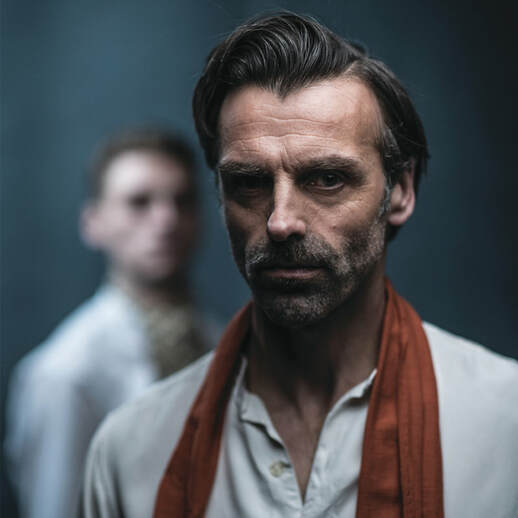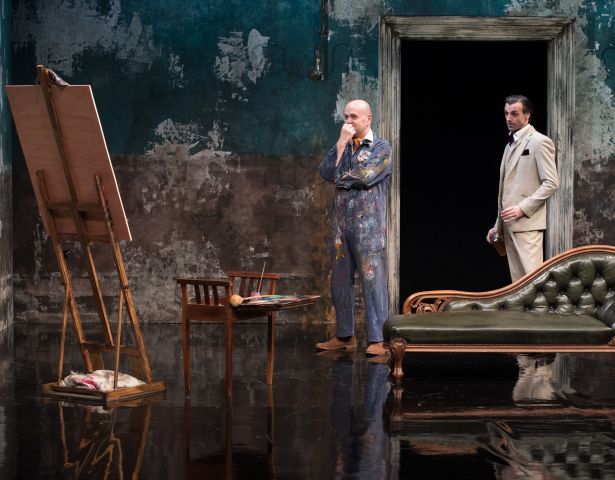REVIEW
✭✭✭✭☆ 4/5
Tilted Wig Productions bring a brand-new production of
Oscar Wilde’s The Picture of Dorian Gray
to the Palace Theatre, Southend,
11-16 March 2019
✭✭✭✭☆ 4/5
Tilted Wig Productions bring a brand-new production of
Oscar Wilde’s The Picture of Dorian Gray
to the Palace Theatre, Southend,
11-16 March 2019
‘Each of us has a heaven and a hell in us.’
The Picture of Dorian Gray is vividly brought to the stage by Tilted Wig Productions, the company that recently staged a successful tour of Great Expectations. As an avid Oscar Wilde fan that has acted and directed in several of his plays, and also studied the novel from which this play is adapted, I was really looking forward to seeing this production, and I wasn’t disappointed.
This story however, is not the light, frothy Wilde we know and love, but a dark and thought provoking Victorian novel. This version, adapted by the director Séan Aydon, is not set in any particular period and appears quite modern in approach. Wilde’s epigrams are still there, particularly in the mouth of Sir Henry Wooton (Jonathan Wrather) who sets out to corrupt the golden youth painted by his friend Basil Hayward. This is a sympathetic performance by Daniel Goode. Jonathan Wrather is well known to TV viewers from Coronation Street and Emmerdale. His descent from smart man about town to a world weary drug addict was very effective.
The setting of the play is a ramshackle, downbeat, decayed studio, as if psychologically, representing the dark and twisted soul that transforms the painting. There is a Freudian aspect, with some nice symbolic touches such as the large bouquet of flowers given to Sybil Vane (Kate Dobson) remains on stage dry and dead. Kate played the young ingénue who turns into an abandoned woman with great feeling. Dorian is desperately in love with this young actress, but having seen her through the eyes of his sophisticated friends, he cruelly rejects her, and from that moment the picture starts to change.
Everything takes place in the decaying artist’s studio which becomes in turn, a theatre green room, Henry Wooton’s house, a morgue, a street, and Dorian’s home. There is an unreal quality about the production which Wilde would have appreciated as he rejected naturalism. He concerned himself with the aesthetics of youth and beauty, and in this play it shows that narcissism, fails to find an object outside itself. The theme being, that Dorian's beauty is superficial, and unlike Basil's art and Lord Henry's social status, will decay in time.
There were some interesting choreographed scenes and the use of a glass for the painting, thus enabling the audience to see Dorian, as he visually changes, rather than a painted prop. Additionally, there were very effective technical effects.
This story however, is not the light, frothy Wilde we know and love, but a dark and thought provoking Victorian novel. This version, adapted by the director Séan Aydon, is not set in any particular period and appears quite modern in approach. Wilde’s epigrams are still there, particularly in the mouth of Sir Henry Wooton (Jonathan Wrather) who sets out to corrupt the golden youth painted by his friend Basil Hayward. This is a sympathetic performance by Daniel Goode. Jonathan Wrather is well known to TV viewers from Coronation Street and Emmerdale. His descent from smart man about town to a world weary drug addict was very effective.
The setting of the play is a ramshackle, downbeat, decayed studio, as if psychologically, representing the dark and twisted soul that transforms the painting. There is a Freudian aspect, with some nice symbolic touches such as the large bouquet of flowers given to Sybil Vane (Kate Dobson) remains on stage dry and dead. Kate played the young ingénue who turns into an abandoned woman with great feeling. Dorian is desperately in love with this young actress, but having seen her through the eyes of his sophisticated friends, he cruelly rejects her, and from that moment the picture starts to change.
Everything takes place in the decaying artist’s studio which becomes in turn, a theatre green room, Henry Wooton’s house, a morgue, a street, and Dorian’s home. There is an unreal quality about the production which Wilde would have appreciated as he rejected naturalism. He concerned himself with the aesthetics of youth and beauty, and in this play it shows that narcissism, fails to find an object outside itself. The theme being, that Dorian's beauty is superficial, and unlike Basil's art and Lord Henry's social status, will decay in time.
There were some interesting choreographed scenes and the use of a glass for the painting, thus enabling the audience to see Dorian, as he visually changes, rather than a painted prop. Additionally, there were very effective technical effects.
Dorian Gray’s character was well played by Gavin Fowler. He started as an idealistic youth, full of energy and optimism. He only begins to change when he sees the finished portrait has captured him in his beauty at that moment. Unlike him it will never age., and he gives his soul to always stay as beautiful. Thus his life takes a dark turn led by Wooton who persuades him that being young means that you can do anything you want no matter how it affects others. As the painting ages with Dorian’s corruption, he still looks as young. The remarkable change of character was well acted as Gavin with no artificial aids morphed into an evil, decadent, corrupted man, whilst looking the same.
Wilde never revealed what vile deeds Dorian had been involved in, although we do see that they led to murder, but imaginary sins can be worse than the real thing.
The novel is still relevant today with its obsession with youth and beauty, rejecting anything that looks old or ugly. However, the director states, ‘This is not a morality tale, but a tale that questions the existence of morality.’ Séan Aydon is to be congratulated for his original approach to the story, which was thoroughly enjoyed by all as an interesting piece of theatre.
Review Jacquee Storozynski-Toll
Tilted Wig Productions - https://www.tiltedwigproductions.com/dorian-gray
The play continues at the Palace Theatre until Saturday 16 March 2019
Mon to Thurs 8pm & Thurs 2.30pm - £31, £29, £25
Fri and Sat 2.30pm & 8pm - £33, £31, £27
www.southendtheatres.org.uk
Prices shown are inclusive of any applicable booking fees. Groups of 10+ please call Box Office 01702 351135 to buy fee-free.
Wilde never revealed what vile deeds Dorian had been involved in, although we do see that they led to murder, but imaginary sins can be worse than the real thing.
The novel is still relevant today with its obsession with youth and beauty, rejecting anything that looks old or ugly. However, the director states, ‘This is not a morality tale, but a tale that questions the existence of morality.’ Séan Aydon is to be congratulated for his original approach to the story, which was thoroughly enjoyed by all as an interesting piece of theatre.
Review Jacquee Storozynski-Toll
Tilted Wig Productions - https://www.tiltedwigproductions.com/dorian-gray
The play continues at the Palace Theatre until Saturday 16 March 2019
Mon to Thurs 8pm & Thurs 2.30pm - £31, £29, £25
Fri and Sat 2.30pm & 8pm - £33, £31, £27
www.southendtheatres.org.uk
Prices shown are inclusive of any applicable booking fees. Groups of 10+ please call Box Office 01702 351135 to buy fee-free.
The Tour Continues :-
Tues 19 - 23 March Devonshire Park, Eastbourne
Tues 26 - 30 March Darlington Hippodrome
Mon 1 - 6 April New Wolsey, Ipswich
Mon 8 - 13 April Theatre by the Lake, Keswick
Mon 22 - 27 April Richmond Theatre
Mon 29 April - 4 May Capitol Theatre, Horsham
Tues 7 - 11 May Malvern Theatres
Tues 14 - 18 May Crewe Lyceum
Tues 19 - 23 March Devonshire Park, Eastbourne
Tues 26 - 30 March Darlington Hippodrome
Mon 1 - 6 April New Wolsey, Ipswich
Mon 8 - 13 April Theatre by the Lake, Keswick
Mon 22 - 27 April Richmond Theatre
Mon 29 April - 4 May Capitol Theatre, Horsham
Tues 7 - 11 May Malvern Theatres
Tues 14 - 18 May Crewe Lyceum


